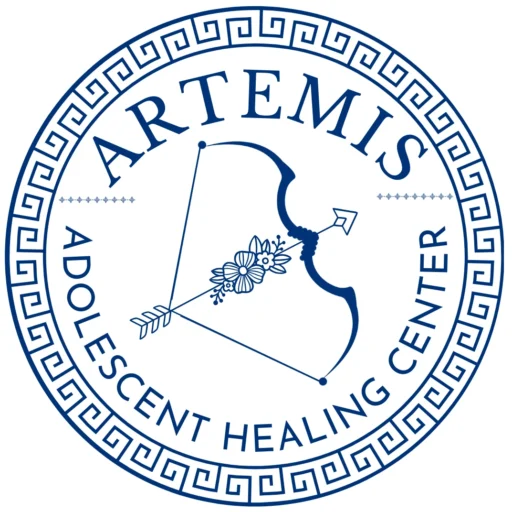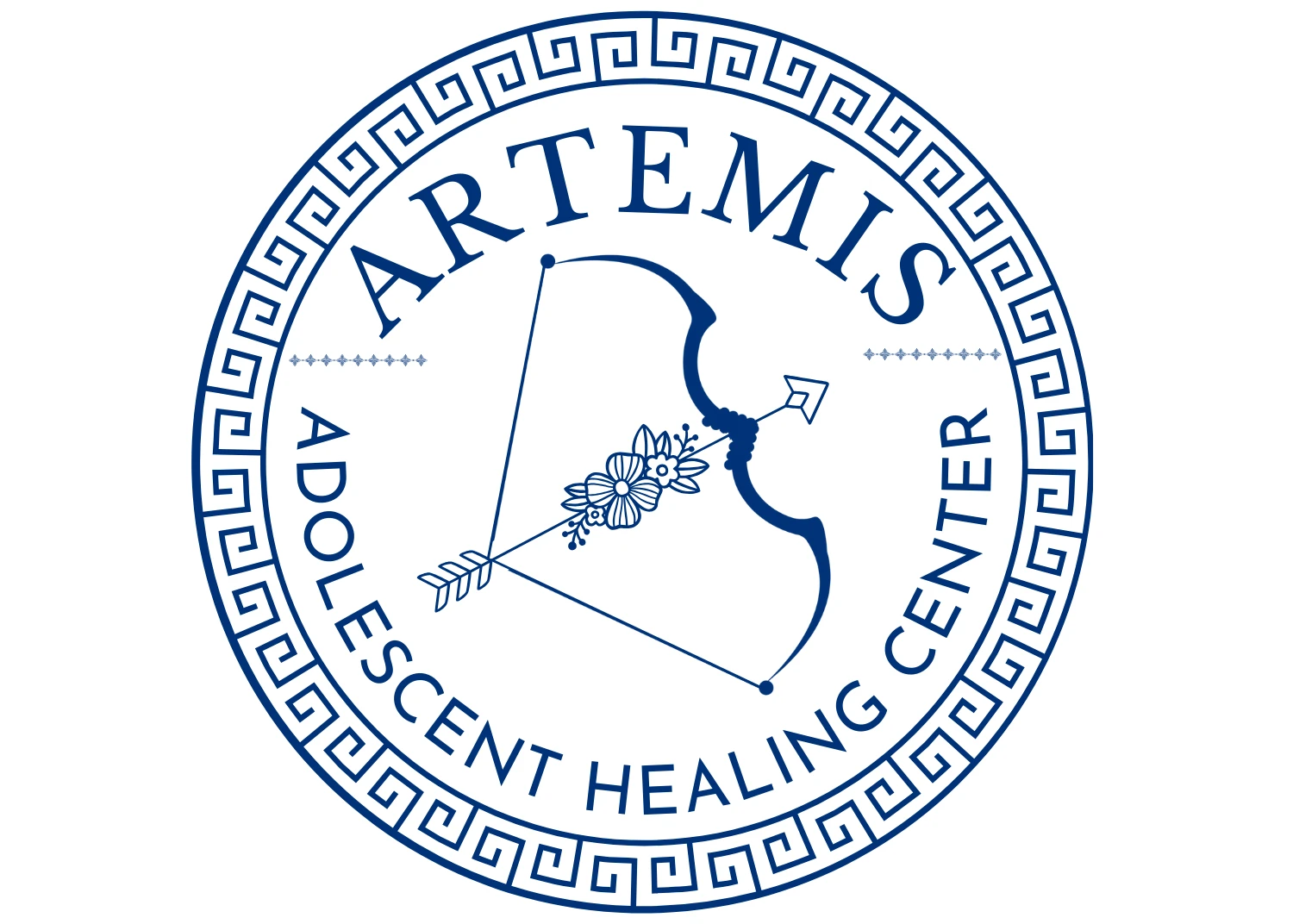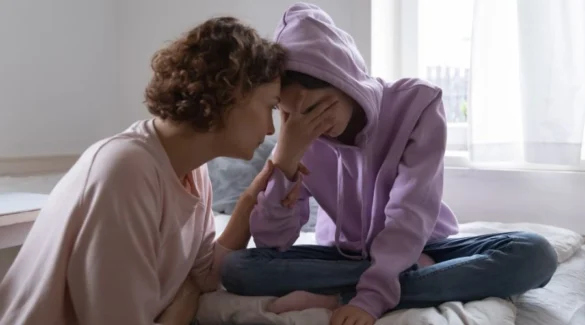Find Proven Anxiety Treatment Options for Your Child at Artemis
It’s unfortunately not uncommon for young people to have the painful symptoms of anxiety disorders, which often appear in stressful situations. The physical symptoms that present when they feel anxious can damage their self-esteem. The persistent and excessive worry causes mental health challenges that last beyond the incident in some youth, disrupting their school and family lives.
Artemis Adolescent Healing Center is a place where teens find professional help to help manage anxiety and reduce its impact on their relationships and education. Our teen anxiety treatment program can help anxious children manage the great distress they feel. The coping skills they develop in our facility become lifelong skills they’ll use in adulthood.
If you hope to better understand your teenager’s anxiety, please continue reading. We’ll help you understand the various types of anxiety disorders and symptoms. This page will also show you how professional care can help teens resume normal activities – anxiety-free.
Get Effective Anxiety Treatment Options at Artemis
Types of Anxiety Disorders in Older Children and Teens
Anxiety is a mental illness. Child anxiety is not the kid “acting up,” or “trying to get attention.” Anxiety is a disorder listed by the American Psychological Association in the Diagnostic and Statistical Manual of Mental Disorders.
At Artemis, we focus on teen anxiety treatment. Still, it’s still important to recognize that even younger children can develop any one of these diseases. Here are several types of pediatric anxiety disorders, according to the Child Mind Institute:
Generalized Anxiety Disorder (GAD)
GAD is a persistent, excessive worry or fear about the happenings of everyday life. Because the worry can become so out of control, it can impact the person’s ability to complete school work, study, or join extracurricular activities. Children become very isolated, which can lead to more severe anxiety.
Mental and Physical Symptoms of Generalized Anxiety in Teens
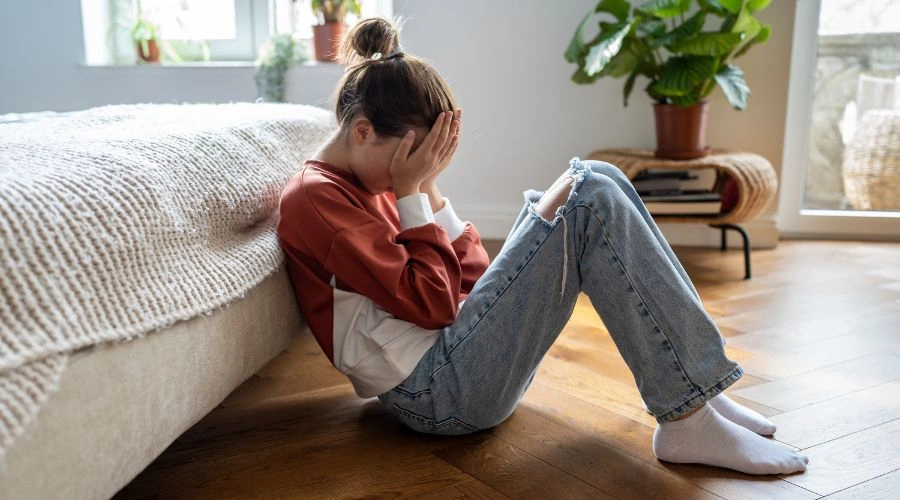
Here are the most common signs of GAD:
- Non-stop worrying
- Unable to control the worry
- Restlessness
- Feeling edgy
- Muscle tension
- Sleep disruptions
- Tiredness or fatigue
- Difficulty concentrating
Left untreated, these will persist beyond the teenage years and into adulthood.
The National Institute of Mental Health (NIMH) estimates that 5.7%, or 19.4 million Americans (children and adults) will experience GAD at some point in life. They do not distinguish between adult and pediatric anxiety in their report.
EXAMPLE
‘Emma,’ 14, was always worried about her school performance, friends, and family members. Her parents found the worrying excessive and unreasonable. When Emma would often feel overwhelmed and tired from long, sleepless nights, her parents sought professional help. With therapy, Emma learned to challenge and question the negative thoughts, restoring her mental health.
Panic Disorder in Adolescence
Panic attacks are sudden, usually recurring periods of debilitating discomfort or fear. Many children with panic disorder start avoiding places or people that can trigger attacks to avoid embarrassment. While fears are a normal part of childhood, they do not resolve independently.
Symptoms of Panic Disorder in Young People
These are the most frequent traits of panic attacks:
- Attacks can be unexpected, sudden, without warning
- Heart pounding
- Trembling or shaking
- Sweating
- Shortness of breath
- Chest pain
- Nausea or stomach feels in knots
- Dizziness, lightheaded, fainting
- Chills
- Hot flashes
- Fear of losing control or dying
Most children experience excessive anxiety at some point – it’s part of normal development. But these episodes are more intense. They do not “grow out of it,” without professional support.
EXAMPLE
‘Jason,’ 15, experienced terrifying panic attacks that led to shortness of breath and left him dizzy. When the fear of panic attacks triggered even more panic attacks, his mother insisted on getting him help. His therapist helped Jason understand the causes of his episodes, and he worked to eliminate them from his life.
Social Anxiety Disorder (SAD) or Social Phobia
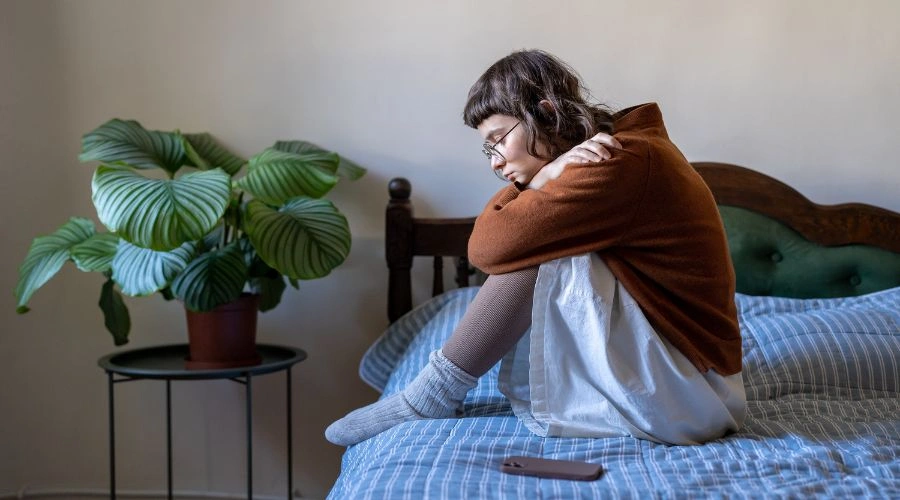
With SAD, anxious teens find themselves in situations where they have an intense fear of embarrassment or being judged by others. Intense social anxiety disorders can lead to a teen missing out on opportunities to enjoy a social life. At worst, they take the spotlight off of themselves and avoid social activities altogether. This defense mechanism denies them the chance to develop communication and relationship skills they’ll need as adults.
Physical and Mental Symptoms of Social Phobia
These symptoms of anxiety may be present in youth with SAD:
- Avoiding situations where others may have negative thoughts about them
- Fear of humiliation or being embarrassed
- Extremely self-conscious around others
- Blushing
- Sweating
- Trembling
- Fast heartbeat
- Unable to cope with peer pressure
- Can’t speak or perform in front of others
Some parents mistake SAD as “shyness,” leaving these children untreated until the condition becomes practically debilitating.
EXAMPLE
‘Carlos,’ 16, had often been bullied by his peers because he was still learning English. He became extremely distraught about what his peers thought of him and eventually avoided speaking to his classmates or joining social events. When his grandmother, who was raising him, realized the problem, she sought professional treatment. Therapy helped Carlos build his self-worth and gain confidence interacting with others.
Separation Anxiety Disorders
Young people with extremely anxious feelings or fears about separation from parents, caregivers, or other attachment figures may have separation anxiety. The condition can cause great discomfort and impair the child’s ability to form friendships and develop social skills.
Separation Anxiety Symptoms in Teens
Separation-anxious teenagers may have these signs:
- Fear of being away from the attachment figure
- Refuses to leave the person to go to school
- Fear of being alone
- Nightmares about separation
- Headaches, nausea, vomited when they expect separation
In many cases, separation anxiety symptoms will resolve before younger children reach their teenage years. If it persists after age 12, it’s time to seek professional treatment.
EXAMPLE
‘May,’ 13, had extreme separation anxiety dating back to her toddler years. The doctors assured her mother that most children outgrew it by age 3 or 4 – but May never did. May so feared separation that she had daily headaches before school. Her academic performance was consistently lower than her peers’.
May’s therapist helped her understand that her fears of something bad happening to her mother were not rooted in reality and helped her swap fearful thinking for positive thoughts. May now goes to school each day without incident, checking in with her mom by text on her lunch break – a more balanced approach that reassures her.
Specific Phobias That Cause Anxiety Symptoms
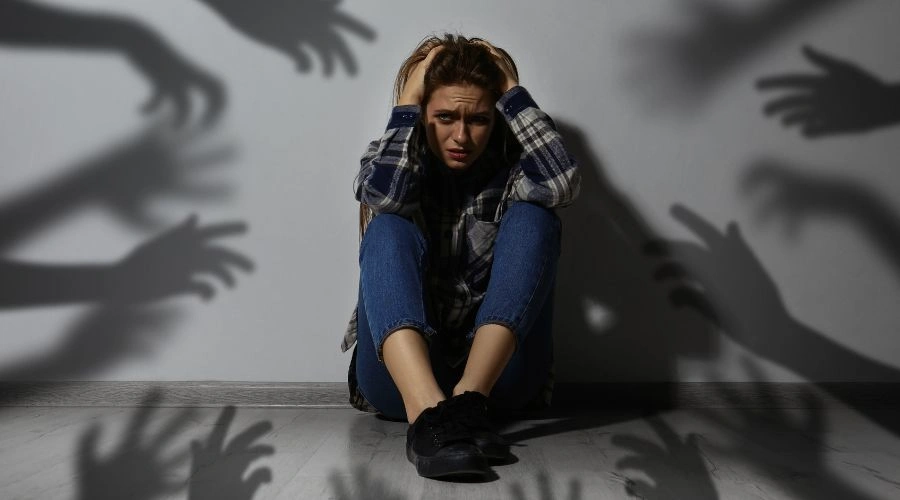
A specific phobia is an irrational fear of certain situations or objects. They commonly include fear of heights, spiders, and flying (there are many reasons for phobias!). People with this condition go to extremes to avoid the things that have triggered their fears. An adolescent psychiatry specialist can help young people confront and minimize these fears in a safe clinical setting.
Symptoms of a Phobia in Teens
Watch for these signs if you suspect your child has an unreasonable fear:
- Fearing an object, place, or situation
- Immediate anxiety when exposed to the ear
- Understanding the fear is excessing
- Avoidance of the phobic trigger
- Sweating
- Trembling
- Rapid heartbeat
NIMH estimates that about 19.3% (almost 1 out of 5) of teens experience specific phobias.
‘Eric,’ 15, intensely feared cats. Even seeing a picture of a feline caused him to tremble and break into a cold sweat. It isolated him, as he couldn’t visit the homes of friends with cats. Eric’s dad realized the problem was not disappearing as his son matured.
When traditional therapy helped but did not eliminate the phobia, the psychiatrist found a medication that calmed Eric’s mind. Eric will now enter a home with a cat, allowing him to form closer friendships.
Specific Medical Condition Anxiety
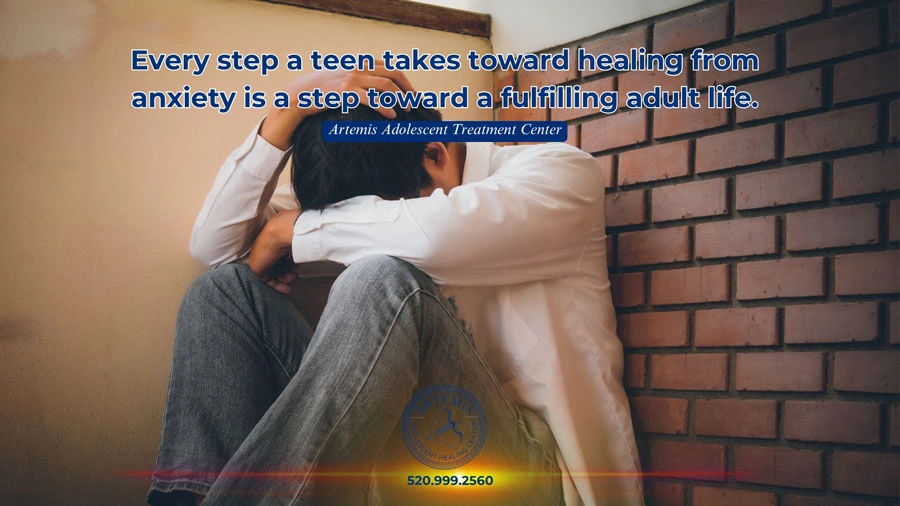
Fearing medical conditions is another reason anxiety can be triggered in many teens. Usually, health anxiety will improve as the condition heals or improves. But if it doesn’t, it can lead to a lifelong struggle with mental health.
Symptoms of Health Anxiety
- Excessive worry about a specific diagnosis
- Worrying about a possible future diagnosis
- Frequent self-exams or self-checks
- Seeking reassurance from loved ones or doctors
- Headaches
- Stomachaches
- Rapid heart rate
Note that these worries can be about a specific diagnosis they have, an illness a close friend or relative has, or a future illness that they’ve not been diagnosed with.
‘Aiyana,’ 16, had asthma like many other children in her rural community. She worried every day that she might die from an asthma attack, even though she kept her inhaler in her pocket at all times. Aiyana avoided physical activities like sports that might trigger an attack.
She often felt isolated from the other kids. Aiyana’s father brought her to counseling to work on resolving her fears about her well-being. Aiyana gained some confidence and is now cautiously participating in sports with her friends.
Get Accredited Treatment Programs at Artemis
What Causes Anxiety Disorders in Children and Teens?
You might ask yourself what can cause children to experience such distress. Here are some of the causes of not only anxiety – but also mood disorders and substance abuse – in teens:
- Social pressure, including, dating, stressful events, or the temptation to drink, use drugs, or skip school
- Excessive social media usage, causing teens to unfairly compare their lives or body image to others.
- Genetic factors (such as differences in brain chemistry handed down from parents)
- Overprotecting or overly critical parents
- Trauma or PTSD, which the Anxiety Disorders Association of America says shares close links with anxiety
- Natural stress in a teenager’s life, such as getting into college or resolving peer conflicts
Any combination of the above can trigger anxiety, which sometimes resolves on its own but often requires a comprehensive treatment program.
Anxiety Treatment at Artemis Adolescent Healing Center

Teens who come to Artemis for help with anxiety will always receive evidence-based, compassionate care from our entire team. We treat anxiety holistically, helping teenagers get relief from their symptoms while also learning the life skills they need to manage anxiety in the future.
Benefits of Choosing Artemis for Your Teen’s Anxiety Treatment
Our team strives to make therapy as stress-free as possible for both you and your teen. Keep reading to learn some reasons to use our services.
Insurance Verification Services
The reality is that many parents worry about treatment costs. Calling our admissions department can put your mind at ease! We work with the top insurance companies and will call them to make sure you receive the maximum possible benefits. Your call to verify insurance benefits is free and always confidential.
Precision Diagnosis
Before we start therapy, our doctor will pinpoint the exact anxiety diagnosis using gold-standard methods. Knowing more about the exact nature of their struggles with anxiety helps us in finding the perfect treatments for your teenager.
Inpatient or Outpatient Treatment
Youth who reside in a supportive home surrounded by caring family members often flourish in an outpatient setting. They attend school during the day and treatment in the evenings. They return to the family home to sleep overnight.
Teenagers who lack a secure home may reap the most benefits from residential care. Inpatient treatment is often the better choice for those who also struggle with substance use disorders or other co-occurring conditions.
Working with Licensed Professionals
Our team includes licensed treatment professionals who understand that teenagers must have a balance structure and compassion. We develop customized programs to meet each teen’s needs, including individual, group, and family therapy sessions. Some frequent methods we use include cognitive behavioral therapy, exposure therapy, and dialectal behavior therapy.
Teens in our programs discover and address the root of their anxiety in talk therapy. They also explore relaxation techniques and other ways to cope to prevent anxiety attacks at the first sign.
Antidepressant Medications
If the anxiety is severe, our doctor may prescribe selective serotonin reuptake inhibitors (SSRI) medications to help reduce the symptoms. These inhibit the brain signals that lead to teens to feel anxious, stopping anxiety and panic attacks effectively.
Using the Proper Forms of Self-Help Resources

The Substance Abuse and Mental Health Services Administration advises that those who don’t receive help for mental health conditions are at an increased risk of suicidal ideation. If you want to continue to learn about how anxiety disorder impacts your child, be sure you choose well-respected, scienced-backed resources.
We recommend the following additional reading:
- CDC provides statistics on the frequency of anxiety in children and teens broken down by age group.
- To learn about the worsening state of mental health for children in Arizona, learn more from the Children’s Action Alliance.
- To learn more about anxiety about medical conditions, we recommend reading this article by St. Jude Children’s Research Hospital.
- The National Alliance on Mental Illness (NAMI) has a guide on how to discuss mental health with your children.
These expert sources have shared precise, factual data to help you learn how to support your child. However, reading doesn’t replace the need for professional treatment.
Up To 100% of Rehab Costs Covered By Insurance
Call Artemis to Reserve a Spot for Your Teenager with Anxiety
Space in our teen anxiety treatment program is limited. We’re confident that the Artemis team can help eliminate (or significantly reduce) your teen’s anxiety and limit its interference in their life. Call us today to reserve a space for your child.
All calls are kept in strict confidence, so please reach out for support options now.
